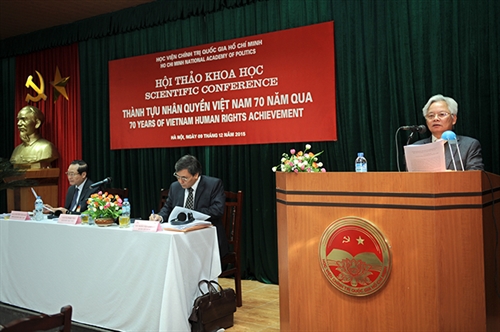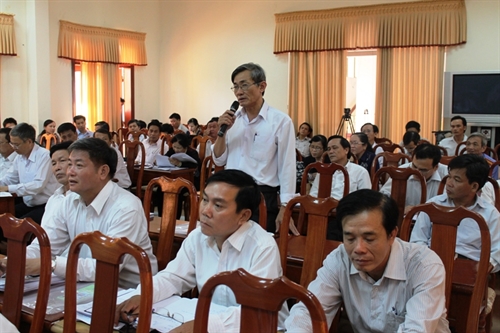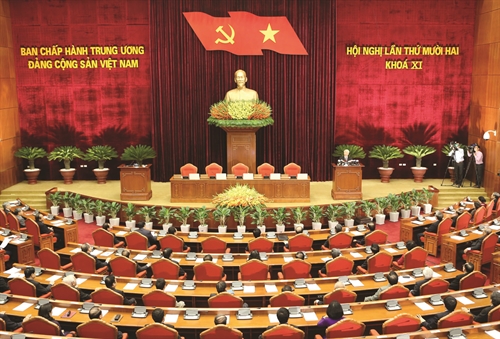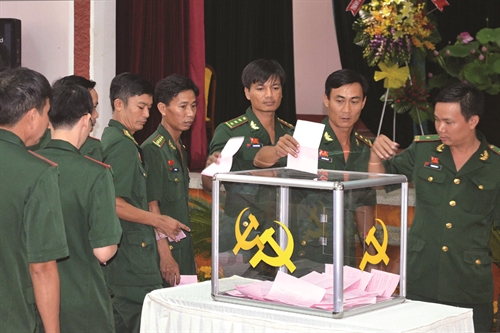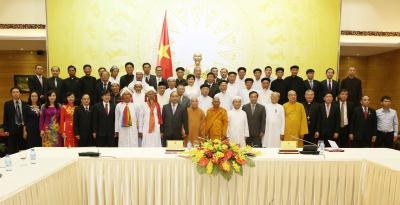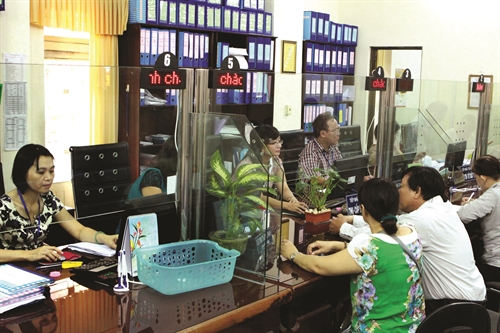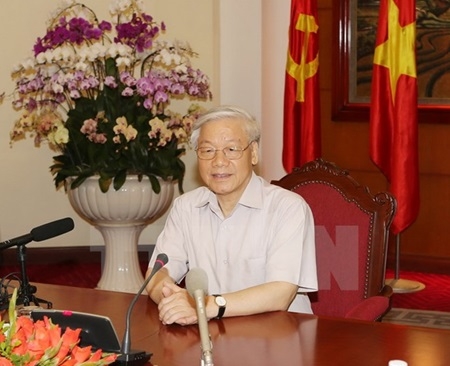The 10th session of the XIIIth National Assembly has been completed with many important decisions made, said National Assembly (NA) Chairman Nguyen Sinh Hung on November 27 in Hanoi.
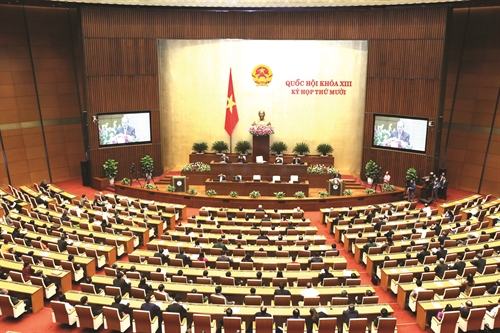 |
| The 10th session of the XIIIth National Assembly closes on November 27 after 40 working days __Photo: Phuong Hoa/VNA |
The NA had approved 16 codes and laws, adopted 15 resolutions and discussed 10 other draft laws, Hung said in his closing speech.
The passed codes and laws concerning civil and penal affairs, civil, criminal and administrative procedures, referendum, maritime activities, custody and detention, organization of criminal investigation agencies, and oversight activities of the National Assembly and People’s Councils, have significant impacts on people’s lives.
They contribute greatly to improving the legal system in the judicial sector, protecting justice, human rights, fundamental rights and obligations of citizens as well as socialist market economic institutions, while helping consolidate national defense and security, social order and safety, and organization and operation of the National Assembly, and stepping up international integration, the NA top leader said.
| Codes and laws | Composition | Effective date |
| Penal Code (revised) | 3 parts, 26 chapters, 426 articles | July 1, 2016 |
| Criminal Procedure Code (revised) | 8 parts, 37 chapters, 510 articles | |
| Civil Procedure Code (revised) | 42 chapters, 517 articles | |
| Law on Online Information Security | 8 chapters, 54 articles | |
| Law on Oversight Activities of the National Assembly and People’s Councils | 10 chapters, 91 articles | |
| Law on Statistics (revised) | 9 chapters, 72 articles | |
| Law on Administrative Procedures (revised) | 23 chapters, 372 articles | |
| Law on Custody and Detention | 11 chapters, 73 articles | |
| Law on Referendum | 8 chapters, 52 articles | |
| Law on Professional Army Men and Defense Workers and Employees | 7 chapters, 52 articles | |
| Law on Organization of Criminal Investigation Agencies | 10 chapters, 73 articles | |
| Law on Hydrometeorology | 10 chapters, 57 articles | |
| Civil Code (revised) | 27 chapters, 689 articles | January 1, 2017 |
| Maritime Code of Vietnam (revised) | 20 chapters, 434 articles | |
| Law on Accounting (revised) | 6 chapters, 74 articles | |
| Law on Charges and Fees | 6 chapters, 25 articles |
The revised Penal Code aims to protect national sovereignty and security, socialism, human rights, citizens’ rights, the right to equality among ethnic minority groups, interests of the State and organizations, and legal order.
New contents such as the criminal liability of legal entities and the scope of legal entities’ criminal liability make up the revised code.
The NA Standing Committee held that the amendments are essential to meet the requirements of prevention and combat of crimes in the new situation, especially economic and environmental crimes.
The code prescribes that the death penalty is not imposed on seven crimes, including plundering property; producing and trading in fake goods being food, foodstuffs or food additives; illegally storing narcotics; appropriating narcotics; destroying important national security works and facilities; disobeying orders; and surrendering to the enemy.
According to Article 40 of the code, death penalty will be exempted for pregnant women or women who are nursing children under 36 months, those who are older than 75 years, and those who are charged with embezzlement and bribery crimes and sentenced to death penalty if they return at least three-quarters of the embezzled assets or have great merits.
The revised Criminal Procedure Code is expected to ensure the prompt and fair punishment of crimes.
It prescribes criminal proceedings, tasks and rights of competent agencies and individuals, rights and obligations of those involved in the procedural process, and international cooperation in criminal procedures.
The code requires sound and image recordings when interrogations take place to ensure transparency and protect citizens’ rights in line with the Constitution.
The Law on Online Information Security prescribes online information security activities; rights and responsibilities of agencies, organizations and individuals in ensuring online information security; civil ciphers; standards and technical regulations on online information security; trading activities in the fields of online information security; development of human resources for online information security; and state management of online information security.
The Law requires agencies, organizations and individuals to ensure security of online information and not to infringe online information security of others. Online information security activities must comply with law, ensure national defense and security and state secrets, maintain political stability and social order and safety, and promote socio-economic development.
The handling of incidents related to online information security must ensure lawful rights and interests of organizations and individuals and not infringe privacy as well as personal secrets of individuals or private information of organizations.
Noteworthily, the Law prohibits the prevention of online transmission of information; illegal intervention, access, damaging, deletion, change, copying or falsification of online information; distribution of spams or harmful software, or establishment of fake or deceitful information systems; or illegal collection, use, distribution or trading of personal information of others.
According to the revised Civil Code, the rights of people who underwent gender reassignment surgeries will be recognized.
Regarding this particular issue, the NA Standing Committee stressed the importance of the country’s laws to recognize and respond to the demands of this social group, as well as to comply with international legal standards.
According to the code, those who underwent gender reassignment surgeries will not only be allowed, but also have a legal obligation, to make changes to their personal records at state agencies. They also have all rights retained as prescribed by law.
Other important amendments concern the maximum annual interest rate that can be charged on a loan. NA deputies agreed with the option to set the maximum annual interest rate of 20 percent for a loan, instead of using the central bank’s prime interest rate as an indicator.
According to Nguyen Si Dung, Deputy Director of the National Assembly Office, the codes and laws passed during this session contribute to improving Vietnam’s legal system to comply with international practices in the spirit of stepping up judicial reform, building a socialist state ruled by law, ensuring human rights prescribed in the Constitution, improving socialist market economy institutions, consolidating national defense and security as well as social order and safety.
During this session, the NA has decided on the socio-economic development plans for 2015 and five years from 2016 to 2020; the mid-term public investment plan during 2016-20; and the 2016-20 five-year financial plan.
Particularly, the NA agreed that from January 1, 2016, pension will be adjusted for persons who enjoy a pension or a working capacity loss allowance of under VND 2 million per month, and that allowance for preschool teachers with their working period prior to 1995 will also be adjusted so that their pension can reach the basic salary level.
The NA assigned the Government to increase the basic salary from the current VND 1.15 million per month to VND 1.21 million per month for cadres, civil servants, public employees and those working in armed forces units, from May 1 next year.
The NA agreed not to pass the revised drafts of the Law on Import Duty and Export Duty and Law Amending a Number of Articles of the Laws on Taxes, saying they should be further studied and discussed. It also agreed to retain History subject in the new textbook curriculum.
Election day for the new National Assembly selected
Specially, for the first time, NA deputies and people saw the question-and-answer session being conducted with questions addressed to all cabinet members.
“The question-and-answer session was conducted in a frank, honest, responsible and constructive manner and received great attention from the public,” NA Chairman Hung said.
NA deputies’ questions focused on practical issues such as direction and administration activities of the Government; problems and limitations in implementation of policies; short- and long-term strategic orientations on socio-economic development, security and national defense, protection of national sovereignty, and improvement of people’s lives.
During this 10th session, the NA resolved to establish the National Election Council consisting of 21 members with NA Chairman Nguyen Sinh Hung as the Council’s Chairman, four Vice Chairpersons and 16 members.
The NA decided to choose May 22, 2016, as the election day for the new National Assembly. It also elected Nguyen Hanh Phuc, Director of the National Assembly Office, as the Secretary General of the National Assembly in accordance with the new Constitution.
The NA spent time discussing draft documents to be submitted to the XIIth National Party Congress with major orientations on the country’s socio-economic development plan for the 2016-20 period.
Closing the session, NA Chairman Nguyen Sinh Hung called on the National Election Council and related bodies to make necessary preparations for the next year’s election of deputies to the XIVth National Assembly and deputies to the People’s Councils at all levels of the 2016-21 tenure, and asked them to take synchronous measures to ensure the enforcement of the Constitution as well as codes, laws and resolutions passed during this session.- (VLLF)
15 resolutions adopted Resolution on socio-economic development plan for 2016 Resolution on state budget estimates for 2016 Resolution on investment policy for national target programs for the 2016-2020 period Resolution on allocation of central budget funds for 2016 Resolution on termination of effect of the Working Regulation of the National Assembly Standing Committee, the Ethnic Council, Committees of the National Assembly, and Delegations of National Assembly Deputies Resolution on judicial work Resolution promulgating the Regulation of National Assembly sessions Resolution on implementation of regulations on bailiffs Resolution ratifying the Protocol Amending the Agreement Establishing the World Trade Organization Resolution on specialized oversight activities Resolution on question-and-answer activities Resolution on the election day, establishment of the National Election Council for election of deputies to the XIVth National Assembly and deputies to People’s Councils at all levels of the 2016-2021 tenure Resolution on issuance of government bonds to the international capital market Resolution on election of the Secretary General of the National Assembly Resolution on prevention and control of law violations and crimes. |
